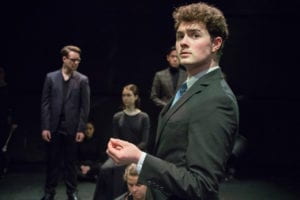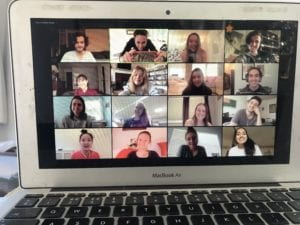 NYU London’s intensive Shakespeare in Performance course involves sixteen actors who audition for their places and who train at London’s Royal Academy of Dramatic Art (RADA). The course, part of a long-standing partnership between NYU London, Tisch, and RADA, always concludes with the performance of a Shakespeare play. When COVID-19 necessitated the move to distance learning, both students and instructors were determined that the show must go on.
NYU London’s intensive Shakespeare in Performance course involves sixteen actors who audition for their places and who train at London’s Royal Academy of Dramatic Art (RADA). The course, part of a long-standing partnership between NYU London, Tisch, and RADA, always concludes with the performance of a Shakespeare play. When COVID-19 necessitated the move to distance learning, both students and instructors were determined that the show must go on.
In a normal semester, the students train at RADA for full days on Wednesdays, Thursdays and Fridays throughout the term. The training culminates in two full-time weeks of rehearsals and a final performance of the Shakespeare play. This final performance is always organised such that students share roles so that each actor has approximately the same number of lines and stage time. It is usually an intense and intimate experience.
Course Director Geoff Bullen, in collaboration with his RADA colleagues, has chosen to see this forced change of approach as an opportunity to experiment. This year, RADA’s Gary Lagden, whom Geoff calls “an exceptional teacher / director,” with whom only half of the students had a chance to work with before NYU London closed, will direct an abridged Coriolanus, tailored to video. According to Geoff, “The plan is to take advantage of the format (and its inevitable unevenness) and have the play be devised as a kind of samizdat, an underground or revolutionary kind of action, but still with a keen focus on language, imagery, and delivery. It could be ideal for editing into a showcase.” The virtual performance will be delivered via NYU Zoom.
Instead of two weeks rehearsing together in person, the students will put the performance together over four days of intensive rehearsals. Director Gary Lagden is “really excited about this production.” Having never directed an online Shakespeare play before, he is enthusiastic about the challenge and looking forward to working with the students, saying “my mind has been wonderfully active with ideas.” The challenge, according to Gary, is to in four days create a performance of Coriolanus that “uses the voice as the tool of communication” with the actors “using their own vocality to create scene, mood and character.” He believes it will be both demanding and fun.
Meanwhile, before the rehearsals commence, the training classes that provide the foundation for this final performance are underway. Students in this course are taking on Shakespeare together from around the world. RADA tutor Adrienne Thomas has been very impressed with how constructively the students are working, saying, “I’ve been happily reminded of what a delightful group they are, supportive, bright and imaginative with a real commitment to the work.” She has also seen improvements in their work as they develop their connection to language through breath, body and voice. Although not anticipated, she and others are finding the virtual learning a meaningful experience. “I’m very moved at our ability to communicate over these great distances and at this difficult time. Long may we continue to explore what we share as human beings and what unites us, through the medium of Shakespeare’s wonderful language.”
Marie Kallis, a Tisch junior majoring in Drama, has found the transition to remote learning “fairly smooth” and also inspiring. Marie had known she wanted to study at RADA since she was a freshman because she “adores Shakespeare” and was “really eager to study his worth with the RADA faculty.” Having been looking forward to the experience for so long, Marie was disappointed when she had to leave London but has found the NYU London and RADA teams “have done an excellent job putting together a course for us online and my classmates have continued to stay motivated and engaged, which is such a positive energy and outlook to have.” Although “studying acting is super challenging over Zoom because it primarily relies on being present with your partner(s)”, there have been some opportunities presented by remote learning. Marie appreciates the many individual tutorials, which she finds “immensely beneficial.”In addition, they have found ways to continue some classes that would seem impossible over Zoom, including a Physical Performance class.
 Marie feels that remote learning has provided some unique learning opportunities: I have definitely acquired some tools and techniques that I’ll carry throughout my work. For example, in our physical performance class, it’s been so freeing to not be able to see my classmates or myself on the screen. I feel the freedom to move without ever worrying about if what I’m doing is “incorrect” based on what other people in the class are doing.”And, during our presentations, Zoom made it possible for me to feel like my scene partner and I were the only two in the room, as we couldn’t see the rest of the faculty. And, that’s how it should always feel – feeling present in the moment with who is on stage with you and having an awareness that the audience is there, but throwing all the judgement and the feeling like you’re being “watched” out the window.
Marie feels that remote learning has provided some unique learning opportunities: I have definitely acquired some tools and techniques that I’ll carry throughout my work. For example, in our physical performance class, it’s been so freeing to not be able to see my classmates or myself on the screen. I feel the freedom to move without ever worrying about if what I’m doing is “incorrect” based on what other people in the class are doing.”And, during our presentations, Zoom made it possible for me to feel like my scene partner and I were the only two in the room, as we couldn’t see the rest of the faculty. And, that’s how it should always feel – feeling present in the moment with who is on stage with you and having an awareness that the audience is there, but throwing all the judgement and the feeling like you’re being “watched” out the window.
All are optimistic that the course work will pay off. As the training continues and preparations for the final performance commence, Director Gary Lagden is hoping to explore theatrical truth through the screen. “The glory of this new digital restriction being mined and exploited to create a creative constraint that can achieve a true synthesis of performer and sound. This production will be in close up. It will be necessarily low tech and edgy. It will aim for truth and transformation. The wonderful work that the actors have undertaken with the RADA tutors now being the foundation of this performance.”
Marie is similarly enthusiastic about the online production. The final show is something all the students look forward to, so she was “thrilled” to learn it would go forward and finds it “really thoughtful of our faculty to make this possible for us.” Although it has “definitely been an adjustment to perform via the camera and work out all the technical kinks that come with an online production,” Marie is grateful to work with “an amazing director” who is Gary Lagden, who we were all so excited to work with again. He is “really making this process worthwhile.”
Understanding the challenges of an online performance, Geoff and Gary and the students have chosen to embrace the challenge and not aim for perfection in this unique, shared event. They will celebrate the happy accidents in performance and technical blips. Gary’s vision is that, “We will work together to tell this tale; we will challenge ourselves to be present and heroic in action.”